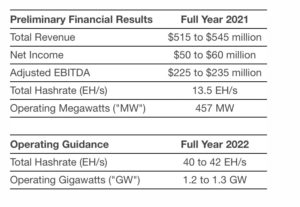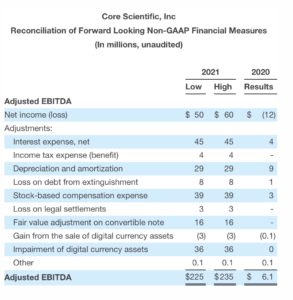- Preliminary 2021 revenue of $515 million to $545 million, net income of $50 million to $60 million and adjusted EBITDA of $225 million to $235 million
- Expects total operating hashrate of 31 EH/s to 40-42 EH/s, and operating capacity from 1.0 GW to 1.2-1.3 GW in 2022
- Produced 981 bitcoins, increased self-mining hashrate to 8.2 EH/s and increased hosted hashrate to 7.7 EH/s in February 2022
AUSTIN, Texas–(BUSINESS WIRE)–Core Scientific, Inc. (NASDAQ: CORZ) (“Core Scientific” or “the Company”), a leader in high-performance, net carbon neutral blockchain infrastructure and software solutions, today announced preliminary financial results for the fiscal year ending December 31, 2021, initial fiscal year 2022 operating guidance and February production and operations updates.
2021 PRELIMINARY RESULTS AND EARNINGS RELEASE DATE
“Our team’s outstanding efforts this past year delivered strong financial results that comfortably exceeded our expectations,” said Mike Levitt, Core Scientific Chief Executive Officer. “We expect 2021 revenue to be $515 million to $545 million, net income of $50 million to $60 million and adjusted EBITDA of $225 million to $235 million. We ended the year having produced 5,769 bitcoins and operating total hashrate of 13.5 EH/s, well ahead of our anticipated 11.0 EH/s. We are pleased with the performance of our company, our team and our infrastructure, and look forward to continuing to build value for our shareholders in 2022.”
Core Scientific expects to release fourth quarter and full fiscal year 2021 results after the market closes on March 29, 2022 and will hold a conference call later that day. Please visit the Events and Presentations section of the Company’s website to learn more:
https://investors.corescientific.com/investors/events-and-presentations/default.aspx
2022 OPERATING GUIDANCE
“We believe that we are well positioned to achieve 40 to 42 EH/s of total hashrate by year end 2022, distributed approximately evenly between our self-mining and hosting segments. Demand for our hosting capacity remains strong and continues to exceed our available supply. Our construction and power team is on pace to achieve 1.2 to 1.3 GW of operating infrastructure by year end to continue expanding our hosting and self-mining capacity,” Mr. Levitt added.
Summary of preliminary 2021 financial results and 2022 operating guidance:

CAPITAL MARKETS ACTIVITIES
Core Scientific’s Board of Directors voted unanimously to accelerate by approximately four months the expiration of the “lock-up” restricting the sale of stock held by early (pre-public) investors in the company. The Board determined that it was in the best interests of the company to increase the shares available for trading in the open market.
“By enabling early private round investors to sell shares we hope to increase our traded float,” commented Mr. Levitt. “We welcome these sales as we believe that increasing our float will benefit our company and is in the best long-term interests of all of our shareholders. Affiliates of the company, including myself, my fellow board members Matt Minnis and Darin Feinstein, and executive officers Todd DuChene, Michael Trzupek and Brian Neville, are not currently eligible to sell shares under the exemption provided by Rule 144.”
FEBRUARY UPDATE
Mr. Levitt continued, “We ended 2021 operating data centers in four states with total mining capacity of 13.5 EH/s. Two months later we were operating in five states, with a sixth state in view, and had increased our hashrate to 15.9 EH/s. Across our business, our team is delivering strong growth and outstanding results that continue to position Core Scientific as a leading blockchain infrastructure provider and digital asset self-miner.”
Self-Mining
Core Scientific’s self-mining operations produced 981 bitcoins in February, averaging 35 bitcoins per day, an increase from January’s 34.7 daily average, and representing a year over year increase of 313%. As of February 28, 2022, the Company held 7,355 bitcoins produced from operations.
As of February month end, Core Scientific operated its own fleet of more than 80,000 bitcoin miners, producing 8.2 EH/s.
Hosting
In addition to its self-mining fleet, as of February 28, 2022, Core Scientific provided infrastructure, technology and operating support for a diverse group of customers representing 7.7 EH/s.
“Strong demand for hosting is driven by both additional capacity requests from existing customers and inquiries from new customers,” said Mr. Levitt. “While requests for hosting currently exceed our available supply, planned infrastructure additions in late 2022 should create capacity for additional hosting customers.”
Infrastructure
Phase 1 of the Company’s Denton, Texas facility began operation on February 22 with an initial operating capacity approaching 22 MW. When completed, the Company anticipates the entire site will comprise seven of the Company’s proprietary cathedral structures as well as a fleet of three-dozen Antbox mining containers. The Company expects to approach full operating capacity of 300 MW at the Denton data center by the end of 2022.
Grid Support
In the month of February, the Company powered-down portions of its operations in two states on 14 separate occasions. Aggregate electrical curtailment for these events exceeded 4,400 megawatt-hours. As the Company has demonstrated throughout the winter months, it will continue to work with the communities and utility companies in which it operates to enable and ensure electrical grid stability.
ABOUT CORE SCIENTIFIC
Core Scientific is one of the largest publicly traded, net carbon-neutral blockchain infrastructure providers and miners of digital assets in North America. Core Scientific has operated blockchain infrastructure in North America since 2017, using its facilities and intellectual property portfolio that has grown to more than 70 patents or applications for digital asset hosted mining and self-mining. Core Scientific operates data centers in Georgia, Kentucky, North Carolina, North Dakota and Texas, and expects to commence operations in Oklahoma in the second half of 2022. Core Scientific’s proprietary Minder® fleet management software combines the Company’s hosting expertise with data analytics to deliver maximum uptime, alerting, monitoring and management of all miners in the Company’s network. To learn more, visit http://www.corescientific.com.
As of September 30, 2021, over 50% of the power used in Core Scientific’s operation was generated from non-carbon emitting sources by local power providers pursuant to long-term power contracts. The Company determines whether power is generated from non-emitting energy sources from dispatch reports or grid generation mix reports provided by the Company’s power providers. Based on these reports Core Scientific purchased Green-e certified renewable energy credits (“RECs”) to offset 100% of the carbon produced as a result of its contracted power. The Company expects to maintain its net carbon neutrality by increasing its overall use of renewable power and by purchasing RECs when necessary.
FORWARD LOOKING STATEMENTS AND EXPLANATORY NOTES
This press release includes “forward-looking statements” within the meaning of the “safe harbor” provisions of the United States Private Securities Litigation Reform Act of 1995. Forward-looking statements may be identified by the use of words such as “estimate,” “plan,” “project,” “forecast,” “intend,” “will,” “expect,” “anticipate,” “believe,” “seek,” “target” or other similar expressions that predict or indicate future events or trends or that are not statements of historical matters. These forward-looking statements include, but are not limited to, those related to the Company’s ability to scale and grow its business, source clean and renewable energy, the advantages and expected growth of the Company, future estimates of revenue, net income and adjusted EBITDA, future estimates of computing capacity and operating capacity, future demand for hosting capacity, future estimate of hashrate (including mix of self-mining and hosting) operating gigawatts, future projects in construction or negotiation and future expectations of operation location, orders for miners and critical infrastructure, future estimates of self-mining capacity, the public float of the Company’s shares, future Infrastructure additions and their operational capacity, and operating capacity and site features of the Company’s operations center in Denton, Texas. These statements are provided for illustrative purposes only and are based on various assumptions, whether or not identified in this press release, and on the current expectations of the Company’s management. These forward-looking statements are not intended to serve, and must not be relied on by any investor, as a guarantee, an assurance, a prediction or a definitive statement of fact or probability. Actual events and circumstances are difficult or impossible to predict and will differ from assumptions. Many actual events and circumstances are beyond the control of the Company. These forward-looking statements are subject to a number of risks and uncertainties, including those identified in the Company’s reports filed with the U.S. Securities & Exchange Commission, and if any of these risks materialize or our assumptions prove incorrect, actual results could differ materially from the results implied by these forward-looking statements. Accordingly, undue reliance should not be placed upon the forward-looking statements.
Year over year comparisons are based on the combined results of Core Scientific and its acquired entities.
Core Scientific provides this and any future similar unaudited updates to provide shareholders with visibility into the Company’s results and progress toward previously announced capacity and operational projections.
ADJUSTED EBITDA
Adjusted EBITDA is a non-GAAP financial measure defined as our net income or (loss), adjusted to eliminate the effect of (i) interest income, interest expense, and other income (expense), net; (ii) provision for income taxes; (iii) depreciation and amortization; (iv) stock-based compensation expense; and (v) certain additional non-cash and non-recurring items. For additional information, including the reconciliation of net income (loss) to Adjusted EBITDA, please refer to the table below. We believe Adjusted EBITDA is an important measure because it allows management, investors, and our board of directors to evaluate and compare our operating results, including our return on capital and operating efficiencies, from period-to-period by making the adjustments described above. In addition, it provides useful information to investors and others in understanding and evaluating our results of operations, as well as provides a useful measure for period-to-period comparisons of our business, as it removes the effect of net interest income (expense), taxes, certain non-cash items, variable charges, and timing differences. Moreover, we have included Adjusted EBITDA in this press release because it is a key measurement used by our management internally to make operating decisions, including those related to operating expenses, evaluate performance, and perform strategic and financial planning.
The above items are excluded from our Adjusted EBITDA measure because these items are non-cash in nature, or because the amount and timing of these items is unpredictable, not driven by core results of operations and render comparisons with prior periods and competitors less meaningful. However, you should be aware that when evaluating Adjusted EBITDA, we may incur future expenses similar to those excluded when calculating these measures. Our presentation of this measure should not be construed as an inference that its future results will be unaffected by unusual or non-recurring items. Further, this non-GAAP financial measure should not be considered in isolation from, or as a substitute for, financial information prepared in accordance with GAAP. We compensate for these limitations by relying primarily on GAAP results and using Adjusted EBITDA on a supplemental basis. Our computation of Adjusted EBITDA may not be comparable to other similarly titled measures computed by other companies because not all companies calculate this measure in the same fashion. You should review the reconciliation of net income (loss) to Adjusted EBITDA below and not rely on any single financial measure to evaluate our business.
The following table presents a reconciliation of net income (loss) to Adjusted EBITDA for the fiscal years ended December 31, 2021 and 2020:

